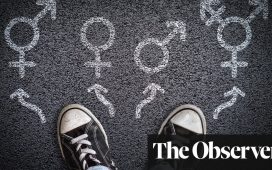Curbs on children’s access to online pornography need to be brought in urgently to stop the spread of an activity that is partly to blame for normalising sexual harassment in schools, according to the new children’s commissioner for England.
Dame Rachel de Souza is urging governments and tech companies to introduce age verification checks. She warned that access to hardcore pornography was shaping children’s expectations of relationships and was partly to blame for thousands of testimonies of sexual harassment by schoolchildren published on the Everyone’s Invited website over the last few months.
The testimonies prompted Ofsted to carry out a review of what was happening in schools. Its report, published last week, revealed that inspectors found sexual harassment and online sexual abuse to be a routine part of pupils’ lives.
“We can’t ignore that, nor should we,” de Souza told the Observer. “One area I’m clear on is that online hardcore pornography warps boys’ expectations of normal relationships and normalises behaviours that girls are then expected to accept, and it’s just too easy for children to access.”
“Most children who have seen pornography say the first time it was accidental. In the real world, adults wouldn’t leave something dangerous or inappropriate lying around for children to stumble upon – why should the internet be different?”

She is bringing up the subject with G7 leaders this weekend in her role as a member of the Gender Equality Advisory Council. She wants a focus on effective age verification online. “Nobody thinks the acceptable price of privacy and freedom of choice for adults should be unrestricted access to porn for children,” she said.
However, experts warned that blanket porn blocks may be neither effective nor helpful. Ruth Eliot, a sexual violence prevention specialist at the School of Sexuality Education, which runs workshops in schools, said that trying to stop young people from finding online porn was “a fool’s errand”. “Abstinence-based education around sexuality has never worked. Young people choose to watch porn as a result of a perfectly natural and normal curiosity about sexuality. Instead of policing that, we should upskill them on how to experience porn in a way that makes them understand the cultural context and that it’s not an instruction manual.”
Ellena Martellozzo, an associate professor of criminology at Middlesex University, said her research showed that the priority should be on preventing children from accessing violent porn accidentally. This kickstarts a cycle in which they shift from seeing it as “shocking” and “disgusting” to developing an interest in it.
“Children rely on porn to learn about sex and relationships, when what they see isn’t a healthy way of viewing relationships at all,” she said. “Pornography is one of many risk factors that can lead to sexual violence.”
While she recommended that the government include a porn block in the forthcoming online safety bill, potentially replicating legislation barring under-18s from accessing gambling sites, she warned that this would not be a “silver bullet”. Instead, schools should incorporate discussion of porn into sex education, since too many still consider it “not appropriate to talk about porn”.
In 2019, the UK government approved plans to become one of the first countries in the world to introduce a nationwide age verification system for online pornography, which would have required sites to check credit cards or require the purchase of a “porn pass” age verification document. However this was abandoned due to technical challenges and privacy concerns.
Geoff Barton, general secretary of the Association of School and College Leaders, said that while sex education in schools was important, they “cannot win the wider battle on their own”, and that there “hasn’t been anywhere enough action in respect of policing the online environment”.
A spokesperson for the Department for Education said de Souza had been invited to discuss with tech companies, law enforcement, children’s charities and schools how to make children safer online.
She said: “This will include working with schools, parents and charities to support them around building strong social norms against underage access to pornography.”



